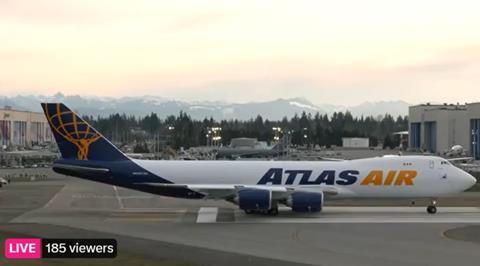The final Boeing 747 to be built left the airframer’s Everett, Washington plant on 1 February, closing a five-decade-long era for the US airframer.
The aircraft with the registration number N863GT, which was delivered to cargo carrier Atlas Air Worldwide on 31 January, left its parking position at precisely 7:47 local time, and received a water cannon salute as it taxied to runway 16R at Paine Field, north of Seattle.
It lifted off from the airfield at 8:19 local time, and headed southeast for Atlas hub Cincinnati. Before it left the Seattle area, however, it performed one final fly-by over the factory complex which has produced 1,574 of the type since 1969.

But while the events over the past two days mark the end of a long and successful chapter in Boeing’s history, the youngest 747 airframe will likely fly for the next 40 years, says Atlas Air chief executive officer Jon Dietrich. Atlas was the customer for the final airframes that Boeing produced.
“There’s no specific replacement to the 747-8 and that’s why we are so excited to take the last four,” Dietrich said during yesterday’s delivery event. Atlas now operates 56 of the type in its all-Boeing fleet.
As a last tribute to Boeing and the iconic aircraft that was dubbed “Queen of the Skies”, Atlas will fly a special flight plan in the shape of a crown as it travels from the west coast to Cincinnati.
The aircraft is destined for Apex Logistics, a subsidiary of Swiss freight company Kuenhe + Nagel.
On 31 January, about 9,000 guests and dignitaries, including about 50 retired Boeing employees who developed and constructed the very first aircraft, celebrated the type in the hangar space where much of the airframe’s storied history took place. Actor John Travolta, who is a pilot and type-rated on the 747, was also on hand for the event, and called the jumbo jet “the most well-thought-out and safest aircraft ever built”.
About 350 of the latest variant of the jumbo jet, the 747-8, remain in service today, most of which are freighters. Only 29 of those jets, operated by just a handful of carriers, configured for passenger operations, according to Cirium fleets data.

But demand for the freighter version, the 747-8F, has remained comparatively robust thanks to the type’s unique cargo-hauling capabilities, with 4,325nm (8,010km) of range and a 133t of payload cap, according to Boeing.
While the aircraft revolutionised travel, linked distant cities, and made the world seem smaller in the last decades of the 20th century, it fell out of favour with airlines due to its high operating costs. The carriers have increasingly opted for more fuel-efficient widebody twin-jets like 777s and Airbus A350s for their long haul operations. That trend also forced Toulouse-based Airbus to cease production of its double-decker A380 in 2021.
Boeing had prepared for this moment for several years. It slowed 747 output after disclosing in July 2020 its plans to cease the jumbo jet’s production. Boeing rolled the last 747 off the Everett line in December.
Last of the jumbos: Boeing closes chapter with final 747 delivery

Boeing has delivered its final 747, closing a chapter on an aircraft that revolutionised travel, linked distant cities, made the world seem smaller and became a symbol of American industrial might and of last century’s jet-set culture.
- 1
 Currently
reading
Currently
reading
Final Boeing 747 departs Everett for its new home
- 3
- 4
- 5
- 6
- 7
- 8
- 9
- 10
- 11















































